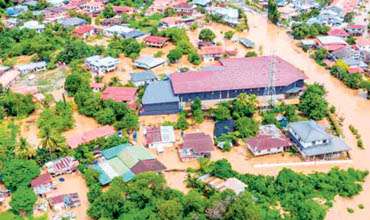FEATURE-Turning point of Sri Lankan tea is in polyphenol based tea marketing
By Lalin I De Silva
I said it earlier and repeatedly now, as the time is opportune to discuss the above topic under an apolitical President with an illustrious career history of strategic interventions. He could light up millions of lives with a single decision taken today, in favour of the suggestions we furnish through this article. Nevertheless, it will become a lost opportunity for the plantation employees if we continue to resort to no action talk only policy. Almost all the plantation issues today are pivoting around a single most indicator which is the NSA or the net sale averages of individual crops.
We are eager to find out who is at fault and not what is at fault. Here is an opportunity for both a strategic intervention combined with IT/ICT based system improvements without further delay with the ultimate objective of turning around plantations industry.
Since I suggested the polyphenol-based marketing a few years back, the Japanese appear to have developed the machine to determine polyphenol content of made tea, tried and tested in many tea growing countries, including in Sri Lanka. Polyphenol based demand for tea, therefore is a strong possibility.
Continuous developments are taking place with many beverage producers with the help of leading beverage universities in the world. We are yet to initiate action in this direction. A high-quality strategic plan is essential to drive the tea industry forward. The entrepreneurial mindset is an absolute need of the hour as more than 75 per cent of the national production of tea comes from the smallholder sector. Growth strategies must take precedent over the regulatory process. It is our candid opinion that the state officials manning the industry are more comfortable with regulation and less interested in growth. Leading an ailing industry only through regulation is somewhat comparable with strangulating to death.
We are somewhat unfortunate that we don't appear to be embracing the MPH concept (meritocracy, pragmatism and honesty) like in Singapore, Dubai etc. But such deficiencies should not be hindrances to support an entrepreneurial culture that can help the tea industry to achieve its true potential (US$5 billion per annum).
Sadly, many developments are taking place in the industry at a global level whereas, we are dilly-dallying with closing down the tea factories owing to introducing additives and creating mayhem by calling the best part of our tea production as refuse tea. Laws are meaningful if the judges consider the circumstances under which the offences have happened. Problems lead to opportunities. Since the industry has more to do and less to celebrate all must strengthen the Tea Board and its chairman. Drawing some clues from both the incidents of 9/11 in the US and the recent COVID-19 issue, our media has a lot to think before acting on tea industry-related media publicity. Responsible media is an absolute necessity towards achieving national growth targets, but not to provide ammunition to our competitors to destroy us lock stock and barrel.
At the bottom of all these issues are the unscientific approaches and corruption to some degree that are obvious. The causal factor that comes loud and clear again is attempting to address the symptoms whilst purposely avoiding solving the problem. For that, we must blame the entirety of the education system, which is absent of analytical and critical thinking skills further perished with an island mentality. In the end, the planting community and the national economy suffers, primarily due to the loss of jobs at the grass-root level.
We must remember that those who are losing jobs were the strong voices of our society who wanted the current President in power with great expectations. The total change will happen if we could condition our minds to start thinking with the end in mind. A strategic intervention aiming at $10 billion revenue per annum from the plantations industry is essential. Almost half of it is the true potential of the tea industry. We need a fully aligned road map to get to the goal fast. Its left to the President to teach his team of leaders the power of strategic management and get everyone to look at one nation-one goal basis. Achieving $10,000 per capita income before the first term of office is over is a fitting challenge.
The Ceylon Planters Society is committed to uplift the industry, and this is another one such intervention with tea. We will also speak of the other crops at the very earliest.
There is sufficient research evidence to conclude that tea improves heart health. Tea can potentially enhance the blood flow around the body by widening key arteries and reducing the risk of clots. Tea also contains antioxidants called 'flavonoids', which would slow down the onset and risk of heart disease.
But the million dollar question we Sri Lankans must ask ourselves today is that are we making full use of the organic compounds in tea, to attract new markets and better prices for tea. The magical experience when drinking tea has very little to do with the grades of tea.
Though green tea was believed to have more polyphenols, it turns out that black tea too has similar amounts. The most potent polyphenol in tea is a substance called EGCG (epigallocatechin gallate), which belongs to a group of flavonoid phytochemicals called catechins. Catechins are polyphenolic compounds from the leaves of tea. In recent studies, catechins were found to be providing various health benefits against numerous diseases. Studies have shown that catechins have antiviral effects against diverse viruses as well.
The significant portion of our tea remains a commodity. As long as we stay on the commodity market, we will continue to be price takers and not price makers. A strategic intervention is required here, aiming at gaining a higher value for tea through the latest concepts of marketing. The national policy should be to only serve tea at national and international functions and not any other competitive beverages. Such nationalistic thinking and acting are yet to emerge.
The worst is that the consumer is not educated the value for money, like in the case of marketing. Value for money (VFM) is not about achieving the lowest price by disposing of large quantities in one single tea auction but weekly. It is about achieving the optimum combination of whole life costs and quality. Traditionally VFM was thought of as getting the right quality, in the right quantity, at the right time, from the right supplier at the right price. Will $10 be too much to ask for a kg of tea, immensely when tea helps you to be healthier? Compare this opportunity with the disease-free happy lifestyle enjoyed by the plantation workers for the past 150 years that stands as living proof for the drinking of tea.
Tea is very much a part of the global beverage industry. The beverage industry is a mature sector and includes companies that market non-alcoholic and alcoholic beverages that are targeted at several market segments such as infants, adults, and elderly populations. In comparison, tea is more suitable for all components. However, we take the easy path of resistance, thus requiring the state intervention, which is more important than getting engaged in plantation workers wage negotiations. The tea industry will turn around the day the government ministers understand their unique role of having to develop and implement policies aimed at improving the socio-economic wellbeing of the Sri Lankans. President Mahinda Rajapaksa achieved the $4000 per capita income goal before his office came to an end by 2015. What we need now is to take it to $10,000 per capita levels before 2025, before the current parliament ends its term.
We are weak in strategy. See how the other non-alcoholic beverage competitors are encroaching our beverage market considering our vulnerable position of strategic execution. Educated youth hoped President Gotabaya Rajapaksa would turn the economy around by using strategy the army is very clever at. Planters have assisted the ministry officials by providing vital financial performance indicators such as NPV, IRR re all crops cultivated so the ministry could understand how to plan and execute a strategic intervention with definitive timelines. It is a pathetic to observe that competitor beverages, without much comparative or competitive advantage, are successfully competing with tea because we have failed to educate our consumers the relative health benefits of tea. It is about time we understand national priorities rather than strengthening economies of multinational and rather than engaged in mundane issues like refuse tea, wages, strikes, climate change we are comfortable with.
The media, whilst making their margins by playing to the gallery, must make it a point to address possibilities of nation-building topics even occasionally. The issues are such as: How to increase medicinal properties in tea, will tea remain beyond 2050, competitive advantages of Sri Lankan tea, do the plantations have measurable soil standards to grow tea sustainably, why food scientists are absent in tea processing value chain in Sri Lanka, is Sri Lankan tea strategically managed, why HR concepts are taboo in plantation management, is the practice of purchasing green leaf to factories purely by weight sustainable, the need of increasing profit per hectare of plantation land annually, and, finally, are their smart plantations in Sri Lanka are pertinent questions to ask. In short, the media can commence a broader dialogue aiming at most problematic industries such as plantations. Like in our vehicles, it is essential to align the nation to one single economic goal, and only the media could do it as the average leadership of the country is absolutely week. Most genuine leaders of Sri Lanka are now in heaven and so do the pioneers of the tea industry despite the rank and file. They built a great initiative that can be marketed as a beverage without guilt. Tea in Sri Lanka is a generic product without guilt. (The writer is a former senior planter and agricultural advisor)
-
Still No Comments Posted.
















Leave Comments